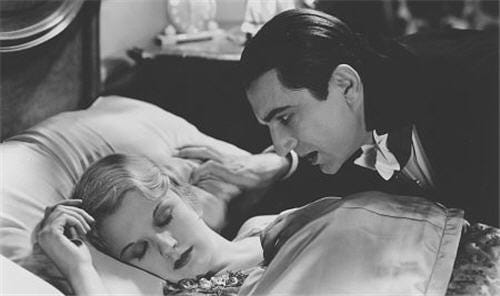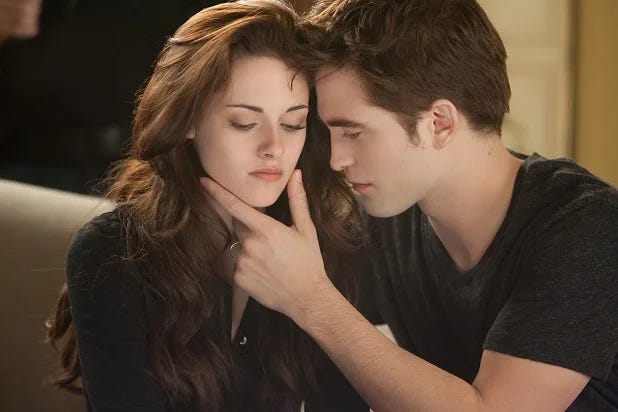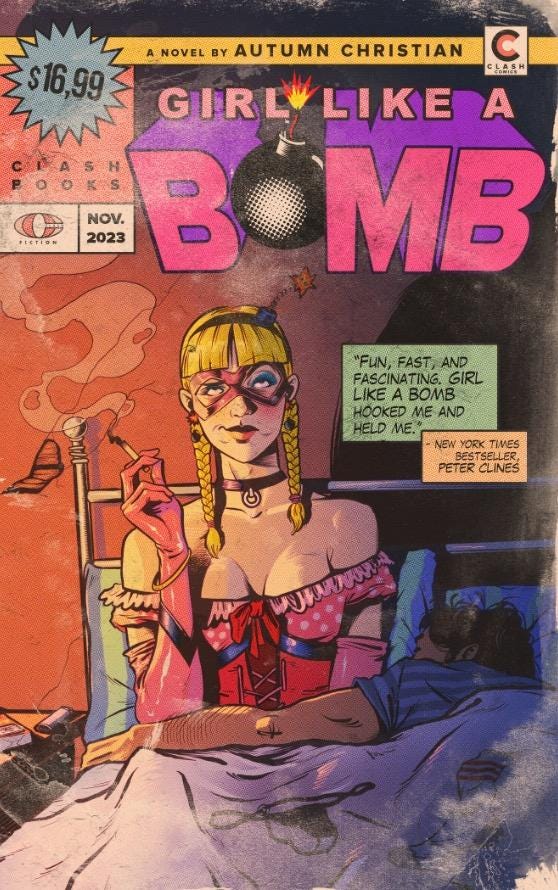NOTE: This is Part 2 of my 5-part Evil Series. If you like this kind of writing, I’d love to have your support via a paid subscription. I need to buy some new socks and a bottle of tequila.
“People who cease to believe in God or goodness altogether still believe in the devil... Evil is always possible. And goodness is eternally difficult.”
― Anne Rice, Interview with the Vampire
Last week I wrote about wanting to join a cult. This week, I long for a vampire to bite me. If the vampire can’t cross the threshold of my home, then I’ll come outside to greet it. I’ll sit in the grass beyond the fence, on a night when the moon doesn’t shine and pull my hair away from my neck. No extra steps. No pretensions. I want it to drag me out into the dark beyond the curve of space, sink its fangs into my heartbeat, take me to the critical moment when I’ll either fade away into nothing or be reborn as a monster.
I have been obsessed with vampires since reading Interview with the Vampire by Anne Rice. When I read about Lestat and Louis in New Orleans, I lost myself in the fantasy that I could be beautiful and dead forever. It didn’t matter that vampires were tormented with the burden of the evil they committed. I was tormented too, but I didn’t have perfect, alabaster skin and superpowers and erotic control of anyone I desired. I was just a shy and nerdy kid.
Vampires have been a part of mythology across most human civilizations. There’s the Romanian Stregoi, the Empusa from Ancient Greece, and the from Ancient India. Some people argue that Lilith, the first wife of Adam from Hebrew texts, could be considered a vampire.
"She wanders about at night, vexing the sons of men and causing them to defile themselves (in their sleep)." - Zohar 3:19a
In the 1991 roleplaying game from White Wolf Publishing, Vampire: The Masquerade, part of the mythology is that the Biblical Cain is the first vampire. “The Mark of Cain” that God gave him granted him immortality, but also condemned him to live in the darkness and drink blood.
That isn’t actually in the Bible, but it feels right. Like the dragon or the witch, the vampire is a monster burned into our psyches. Its origins are primal, beyond our tangible understanding. Surely the vampire has existed alongside us from the beginning. A dark twin, a mirror into death.
Inside every human being is the possibility of a monster.
We see people become monsters all the time, step by step, their humanity drained of them through each decision to be selfish, or angry, or to justify why it's okay to be cruel to get what they want. It makes sense we'd mythologize the end state of that process - a creature with no humanity left, drained of inner light, forced to sustain itself on the life force of the thing it used to be.
But I don't want to be bitten by a ghoul, by the white-clawed, stringy-haired corpse with a face like a fish head. When Bram Stoker wrote Dracula, he transformed the blood drinking corpse into a handsome and clever gentleman. That's what made the vampire all the more intriguing. The vampire wasn't just a warning anymore, he was a lure. He offered not just death and despair, but a trade. Immortality for your soul. Power for love.
I wrote my own vampire story, Sunshine, Sunshine, which was published on the now-defunct Ideomancer and later appeared in my short story collection, Ecstatic Inferno. The vampire in Sunshine haunts the protagonist from childhood to womanhood—a child’s fairy tale lodged in the back of her mind. When the vampire, the Sunshine Man, finally comes to the protagonist, he offers her relief from a mundane life marked by mundanity and disappointment. The protagonist knows she’s giving up her life to the Sunshine Man. She doesn’t care. She never thought she had much of a life to begin with.
Maybe this shifting attitude about vampires is a commentary on how our cultural values have shifted over the years, or how we've evolved to understand evil and its more seductive qualities. Shambling ghouls just don't scare us like they used to. We know more about death and the science of disease, and have become relatively secure in the idea that our relatives won't crawl up out of the dark, bloated and dark purple, to feast on our blood.
But we still feel the pressure of our conscience. Our moral sense mostly comes from our prefrontal cortex, but we feel it like a weight in our hearts. The need to be good is heavy enough to drown us, a cold stone that is more prescient than gravity, more powerful than the sound barrier. When we aren't good, it haunts us. It's a ghost of consequence that lingers long after the act is finished. Sometimes I still wake up in a blind panic because three years ago when I worked at Chili’s because I forgot to give someone their side of ranch. (And trust me, that isn't near the worst thing I've ever done).
Sometimes we aren't rewarded for being good so much as we're punished for being bad. Being good comes with all kinds of responsibility - being kind to others, not reacting to erratic impulses, providing for your family, taking care of people when they need help, brushing your teeth, going to bed at a decent hour, paying taxes, biting your tongue, putting aside your desires, not acting like a fool, not sitting outside in the dark, not sitting out in the dark underneath an empty sky, in a crevasse between the fence and the ditch, in the place where you think God won't find you but the Devil just might, in the place where the wind is stagnant and your heartbeat is so fierce inside you that a creature with acute senses could smell your blood in the air, like a promise, like a lure, like a prayer directed toward the caves and basements and deep places of the earth.
We could give up our goodness for freedom. That’s not such a high price. Many of us would, if only the right opportunity came along. And really, what is good and evil anyway? Sometimes it seems the good inside us isn't a guiding arrow to lead us out of the darkness of existence. It's not leading us anywhere. It's just another trap, a biological burden, an illusion. Maybe we have to forge our path out of the murk, but nobody seems to have a great idea of what exactly that should be. So what, if you had to drink human blood to survive? There are plenty of eager throats.
In Interview with the Vampire by Anne Rice, Lestat explains why vampires are not beholden to ordinary morality:
“Evil is a point of view. We are immortal. And what we have before us are the rich feasts that conscience cannot appreciate and mortal men cannot know without regret. God kills, and so shall we; indiscriminately He takes the richest and the poorest, and so shall we; for no creatures under God are as we are, none so like Him as ourselves, dark angels not confined to the stinking limits of hell but wandering His earth and all its kingdoms.”
Lestat has the same philosophy as many serial killers and cult leaders, the wielder of death who has mistaken their evil deeds and petty crimes as the power of a God. But in exchange, Lestat is not tormented by his vampirism in the same way Louis is, and his grandiose cope is part of the reason.
This brings me to other “good” vampires, like Angel from the Buffy series or Edward Cullen from Twilight. They are vampires who have been burdened with a moral conscience, bloodthirsty killers at heart who have to constantly struggle with their impulses. They often refuse to dine on human beings and resort to killing rats or stealing blood from food banks. Vegan vampires. They're usually a rarity in the vampire world (although a common trope nowadays in literature) they inhabit, choosing not to give in and become monsters like their peers.
One of my favorite vampire books, Sunshine by Robin McKinley, speaks of this:
“There are worse things than being human. And worse things than being a vampire. But it is the in-between that is the hardest.”
They are someone on the precipice of an abyss. They've tasted the darkest desire, its rich and caramel texture, and decided to turn away. They’re beyond redemption. They’ll never experience being human again, except by smelling the warmth of sunlight on a lover’s hair. They could just kill themselves and end the agony, but still, they persist in their torment.
But why?
Why is all that pain worth it, just to hang onto a shred of an idea of the human being that no longer exists inside you?
The vampire is just a fictional construct (as far as we know), but inside that construct lies a truth that we understand about ourselves.
A few years ago a friend of a friend died by drowning in a pool after taking too much Ketamine. Another friend of mine died from an accidental Fentanyl overdose. Two of my friends had cancer scares. My dog died. The economy is bad. People want to convince me the world is ending. Nothing has ever seemed the same after 9/11, and maybe those planes pushed me into some alternate universe where all the optimism we had is gone and now we all sit indoors being wrung through evil algorithms, falling in love with porn bots, trying to sharpen our cynicism on Twitter.
No matter how much meditation and therapy I do, I still get stuck in bad thought patterns. Sometimes, I feel awash in the hopelessness that surrounds me. At any moment I could walk from my candle-lit kitchen down the hallway and fall into a pit, and the pit is so big that when I’m down there I’ll see that the life I had was as small as a mote of dust. All my hope was an inconsequential feast for a monster to dine upon. Sometimes, I wake up in the middle of the night choking on a dead dream, and I can see the laughing skulls of the demons who delight at my fantasy that I could ever be someone. That anything I did matter.
Then I wake up and the daylight chases the vampires away. I remember that life doesn’t have to justify itself. It doesn’t have to be a reward for a job well done. Existence is its own justification. To be able to perceive the dawn, again and again, until you can’t anymore, seems to be worth every staggering cruelty.
As Anne Rice writes:
“You do not know your vampire nature. You are like an adult who, looking back on his childhood, realizes that he never appreciated it. You cannot, as a man, go back to the nursery and play with your toys, asking for the love and care to be showered on you again simply because now you know their worth. So it is with you and mortal nature. You've given it up. You no longer look "through a glass darkly." But you cannot pass back to the world of human warmth with your new eyes.”
Behind the gilded appearance of vampires, they’re still just lonely corpses. A hollow pile of bones, unable to touch or be touched. Nothing to live for. Nothing to die for. The blood they crave doesn’t satisfy. The dark rim of the Earth taunts them with everything that remains out of reach.
Some of my favorite vampire books:
The second edition of Girl Like A Bomb (With a new Epilogue) is now available! Grab it either on Amazon or on the CLASH website.






I am thoroughly loving this series so far and I can’t wait for the rest.
Vampires and werewolves have been my favourite monsters since I was a child. They have so many qualities inside of them that speak to me. The main one is The Other, The Outsider.